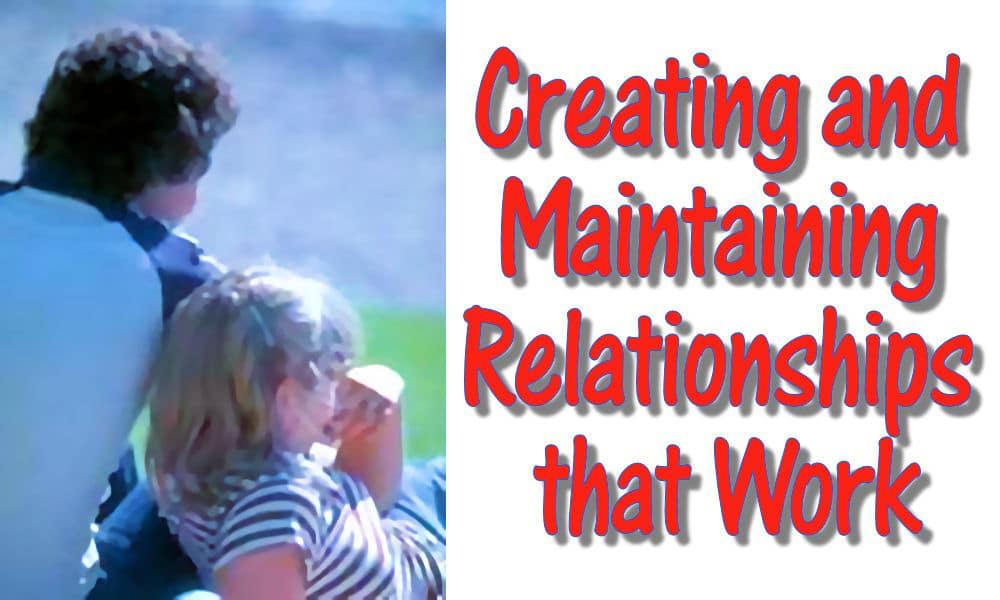- Creating and Maintaining Relationships that Work
- Integrity — What Commitment Looks Like
- Honesty in Communication
- Curiosity Interest and Acceptance
- Self Responsibility — The Most Important Step
Creating and Maintaining Relationships that Work — relationships that work don’t just happen. You have to commit to making them work.

The. Best. Relationship. Ever.
Purchase all formats at Amazon
Purchase digital versions (Apple, Nook, Kobo, etc.) from this page
It’s amazing how often, when we’re talking with other couples, the conversation turns to relationships and relating. As you likely know, I’ve written a couple of books about this topic. (see: The. Best. Relationship. Ever.)
Just the other day I was talking about commitment.
I said,
“In successful relationships, people do not commit to each other.
They commit to a way of being and relating.”
Or,
“We commit to a verb, not a noun.”
We commit to Creating and Maintaining Relationships that Work
I did a Thesaurus.com search on “commit.” Here’s one section:
Synonyms: accept, adopt, appoint, call for, cast, co-opt, commit oneself, crave, cull, decide on, designate, desire, determine, discriminate between, draw lots, elect, embrace, espouse, excerpt, extract, fancy, favor, finger, fix on, glean, judge, love, make choice, make decision, name, opt for, predestine, prefer, see fit, separate, set aside, settle upon, sift out, single out, slot, sort, tab, tag, take, take up, tap, want, weigh, will, winnow, wish, wish for
Antonyms: decline, forgo, refuse, reject, spurn
Source: Roget’s New Millennium™ Thesaurus, First Edition (v 1.1.1) Copyright © 2005 by Lexico Publishing Group, LLC. All rights reserved.
To commit, then, is to opt-in; to select something. Now, you may be saying, “Yeah. And I chose him or her as my life-partner. What’s wrong with that?” And I would reply, “Nothing, other than that it won’t work.”
This is a normal misperception. It’s one of many inside / outside confusions. The only thing I can know is myself, and even that task is never perfectly accomplished.
I can commit, then, only to what I am in direct control of. In other words, I can only commit to what I will do.
Misunderstanding what I can control and what I cannot is what gets us into trouble. Whenever I commit to an external anything, I make a fundamental mistake. The mistake is this: I am actually committing to my present view of the thing I am committing to, which means I am in deep trouble when that external thing changes.
And change it will. I can safely say that the biggest cause of relationship discord is the disenchantment that comes when the object of our affection “changes.”

Let’s create Dick and Jane, and work from Dick’s side of things.
Dick meets Jane, they strike up a conversation, and they decide they like each other. They decide to date.
Now, as soon as they met, each began to create a data file. For Dick, there is a “Jane file,” and it’s filled with bits of information selected by Dick. Initially, he filled it with “enchanting” bits: for example, hormonally driven data about her appearance, smell, what she wears, how she sounds. Let’s call this data, “All the things about Jane that I turn myself on about.”
As time goes by, biographical data is added, as are “likes and dislikes.” Sexual preferences are added as they occur. Safe topics, unsafe topics are added to “do and don’t” lists.
This adding process goes on, not only when Dick and Jane are together, but perhaps more importantly, when Jane is absent. It is during the absences, especially, that Dick attaches meaning to the bits of data in his “Jane” file.
It’s, “Hmm. In the middle of the meal, right after I talked about baseball, Jane got a pained look on her face. She must hate baseball.” Dick inserts “Do not talk about baseball” in the “don’t” file.
Hopefully, you see the problem emerging. THE interpretation Dick made has absolutely nothing to do with Jane.
All Dick knows for sure is that an expression came over Jane’s face during a conversation about baseball. All the rest is Dick, making guesses, without checking with Jane.
Speaking of Creating and Maintaining Relationships that Work:

If your present relationship needs work, well…
check out
The. Best. Relationship. Ever.
It’s my relationships book… you’ll find all the help you need!
Purchase all formats at Amazon
Purchase digital versions (Apple, Nook, Kobo, etc.) from this page
And here’s the weird part.
All of the data collected about Jane is also completely about Dick. (In other words, Dick doesn’t know dick about Jane…)
This is where I lose most people, so stick with me. Let’s set things up for the inevitable disaster, and then return to Creating and Maintaining Relationships that Work.
Initially, Dick is simply turned on by Jane. He likes the length of her skirts, the choice of her clothes and the way she smells. Into Dick’s file goes, “Jane is one sexy woman. Everything about her turns me on.”
During sex, Jane goes, “Mmmm.” And Dick thinks, “Boy, Jane really likes it when I do that. She thinks I’m a great lover.”
This is Dick, inventing things. Dick has created an expectation and a story about who Jane is, based upon his observations and his interpretations.
He totes it all up, and decides that Jane is the woman for him. He decides he’s ready for a commitment.
Dick is about to commit himself to a relationship to the imaginary woman he has created in his head.
We jump ahead to after the engagement, or after the moving-in-together, or after the marriage (the thing Dick committed to, with Jane) and one day he rolls over in bed. Jane is staring at him. She’s dressed in a ratty tee shirt, has morning breath, and says,
Dick, we have to talk. I’ve been thinking about it, and our sex life sucks. You’re the worst lover I’ve ever had. And not only that, you refuse to do what I tell you to do.”
If Dick is normal, he either slinks out of bed or fights back. The fighting back will be,
“You’ve changed. You’re not the woman I married (or whatever.) All the times in the past, you liked it. I heard you go “Mmmm.” You lied to me about who you really are!”
Jane defends and explains. He thinks “betrayed!”, and she thinks, “deceived!”
And on and on. If they go to therapy, they’ll each tell the therapist how betrayed they are. “He/she is not the person I thought he/she was.”
Damn straight.
Jane is who Jane is, and who Jane is, is who Jane is today. Added to all the yesterdays. And tomorrow, she’s everything she was and who she is tomorrow.
And thus it is with everything external that I choose to commit to. A religion. A political party or type. A job or career. Everything changes. Including you. Minute by minute. (You are changing, whether you know it or not, as you read this.)
When we get caught into thinking we commit to a person, we set ourselves up for failure, as such a commitment is to that person at a particular point in time. Absolutely no one living is a static entity, and no one you know is as you perceive them. The picture in your head, as you describe someone, is data about how you interpret that person.
It is not a description of the other person. Ever.
Here’s an example that all siblings know. You’re sitting with your brother or sister, talking about a past event, and you can’t agree on any of the details. If you get the joke, you laugh. If you are dumb, you argue about who is right. And all that is happening is that both of you were there, observing the same event, from two distinct perspectives. Each of you took in what was important to you, and each of you interpreted it. Thus, your description is about you, not about the event.
When couples are shown a video tape of the event just disagreed about, both look at the tape and go, “See! I was right!” Even with the tape, they still see what they are predisposed to see.
So, if you can’t commit to an external without eventually disappointing yourself that the external shifted, what can you commit to?
You commit to Creating and Maintaining Relationships that Work
Here’s the short form:
- I can only commit to an action — to something I will do.
- I commit to being in relationship with you. Here is what I commit to:
- I will be open, honest and vulnerable in my daily communication with you.
- I will tell you, today, who I am and what I am thinking.
- I will tell you, today, everything I have done, and what it meant to me.
- I will listen to you with curiosity and interest, today.
- I will accept that you are who you are today, and will integrate who you are today with my picture of you from “yesterday.”
- I will make myself fully available and present to and with you, today, and engage in clear and concise communication with you for not less than 30 minutes, today.
- I will own all of my thoughts, feelings, emotions and interpretations, working to take full responsibility for each and every one of them. If I slip and go into blaming, I will stop myself, apologise, and return to self-responsibility.
- I will actively encourage you to listen to me and to actively hold me to the performance of what I have committed to.
- I will commit to all of these things, without any expectation of anything from you, as all I can ever commit to is to what I can and will do.





